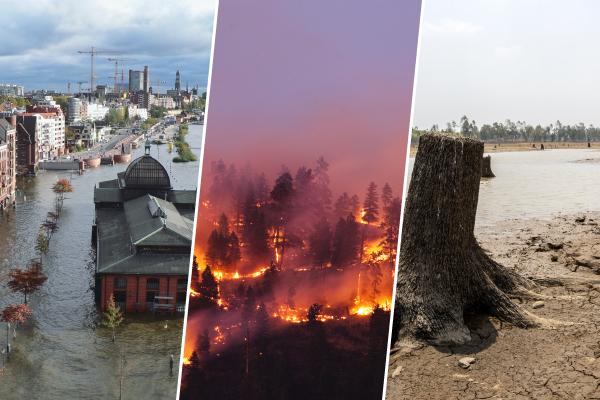How to Reduce Your Impact on Climate Change
Climate change is one of the most pressing challenges facing humanity today. The choices we make in our daily lives contribute significantly to the environmental footprint we leave behind.  However, by adopting sustainable habits and making mindful decisions, each of us can play a crucial role in mitigating the effects of climate change.
However, by adopting sustainable habits and making mindful decisions, each of us can play a crucial role in mitigating the effects of climate change.
This article explores practical strategies to reduce your impact on the environment, empowering you to contribute positively to the planet's future.
Understanding Your Carbon Footprint
Your carbon footprint is the total amount of greenhouse gases, including carbon dioxide and methane, that you produce as a result of your daily activities. These emissions come from a variety of sources, such as transportation, electricity use, and the food you consume. Reducing your carbon footprint is a fundamental step in combating climate change.
Key Areas to Focus On:
- Transportation: Cars, airplanes, and other forms of transportation are significant contributors to greenhouse gas emissions.
- Energy Consumption: The energy used to heat your home, power your devices, and fuel your lifestyle also has a large impact.
- Dietary Choices: The production and transportation of food, particularly meat and dairy, contribute to your carbon footprint.
Practical Steps:
- Opt for Public Transit or Carpooling: Reduce the number of vehicles on the road by using public transportation, carpooling, or cycling.
- Adopt Energy-Efficient Habits: Turn off lights and unplug devices when not in use, and invest in energy-efficient appliances.
- Choose a Plant-Based Diet: Reduce meat and dairy consumption, which are resource-intensive and have a higher environmental impact.
By focusing on these key areas, you can make significant strides in reducing your personal carbon footprint.
Sustainable Living Practices
Sustainable living involves adopting practices that reduce your reliance on natural resources and minimize waste. This approach not only benefits the environment but also promotes a healthier and more conscious lifestyle.
Waste Reduction:
- Minimize Single-Use Plastics: Single-use plastics are a major environmental hazard. Opt for reusable bags, bottles, and containers to reduce waste.
- Composting: Composting organic waste reduces the amount of garbage sent to landfills and provides nutrient-rich soil for gardening.
- Recycling: Properly recycle materials like paper, glass, and aluminum to reduce the demand for new resources.
Water Conservation:
- Fix Leaks: Address any leaks in your home promptly to prevent water waste.
- Use Water-Efficient Fixtures: Install low-flow showerheads and faucets to reduce water usage.
- Smart Landscaping: Choose drought-resistant plants and use mulch to retain soil moisture, reducing the need for frequent watering.
Energy Efficiency:
- Insulation: Properly insulate your home to reduce heating and cooling costs, which lowers energy consumption.
- LED Lighting: Switch to energy-efficient LED bulbs that use less power and have a longer lifespan.
- Renewable Energy Sources: Consider investing in renewable energy sources like solar panels to power your home sustainably.
These sustainable living practices contribute to a lower environmental impact and help preserve natural resources for future generations.
Advocating for Climate Action
Individual efforts to reduce your impact on climate change are essential, but collective action is necessary to achieve meaningful progress. Advocacy plays a crucial role in driving policy changes and encouraging broader societal shifts toward sustainability.
Get Involved in Local Initiatives:
- Support Environmental Organizations: Engage with local environmental groups that work on climate change initiatives and support their efforts through donations or volunteer work.
- Participate in Community Cleanups: Join or organize community cleanups to remove litter from natural spaces and raise awareness about waste management.
Promote Sustainable Policies:
- Vote for Climate-Conscious Leaders: Support political candidates who prioritize climate action and sustainability in their platforms.
- Advocate for Renewable Energy: Encourage local and national governments to invest in renewable energy infrastructure and phase out fossil fuels.
Educate and Inspire Others:
- Raise Awareness: Use social media, blogs, or community events to educate others about climate change and how they can reduce their impact.
- Lead by Example: Demonstrate sustainable practices in your daily life, inspiring others to follow suit.
Advocating for climate action amplifies your impact, creating a ripple effect that can lead to significant environmental change.
The Power of Collective Impact
While individual actions are important, the cumulative effect of millions of people making small changes can drive substantial progress in the fight against climate change. By adopting sustainable habits, advocating for climate action, and inspiring others to do the same, you become part of a global movement working towards a more sustainable future.
Key Takeaways:
- Every Action Counts: Whether it's reducing energy consumption, minimizing waste, or advocating for policy changes, every action you take contributes to the larger goal of combating climate change.
- Sustainability is a Journey: Adopting a sustainable lifestyle is a continuous process. Start with small changes and gradually incorporate more sustainable practices into your daily routine.
- Collaboration is Key: Work with others in your community, and beyond, to amplify your impact and create a lasting difference.
By embracing these principles, you can significantly reduce your impact on climate change and contribute to a healthier, more sustainable planet.
References
- Understanding Your Carbon Footprint
- Sustainable Living Practices
- The Role of Transportation in Climate Change
- Water Conservation Tips
- Energy Efficiency and Renewable Energy
- The Impact of Dietary Choices on Climate
- Waste Reduction Strategies
- The Importance of Advocacy in Climate Action
- The Power of Collective Action
- Leading by Example in Sustainability
































